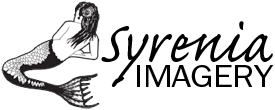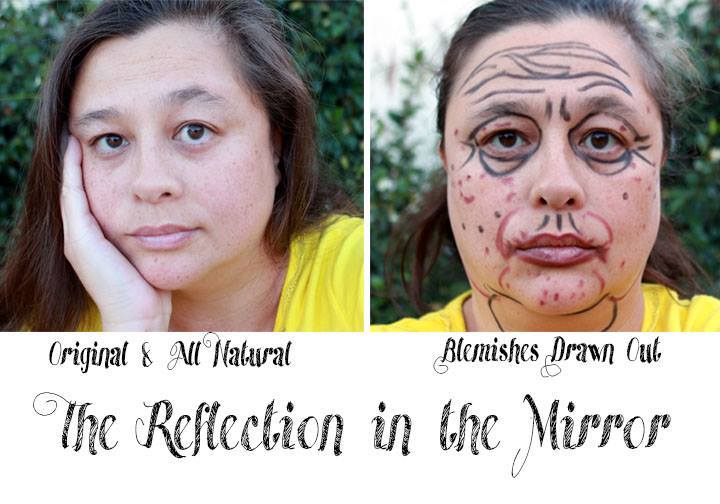My greatest adversary stands in the mirror
There is the perfect skin, very little problem with acne, the thick, beautiful hair, and the unique aspects that make this face original. You may see the natural view at first glance. But what I see when I look in the mirror is hideous in comparison. From the fine lines and wrinkles around the eyes, nose, and lips, to the sun spots and freckles that have evolved from years of living in the desert in my youth, and the bulge from swollen glands in my throat from environmental allergies; it all sticks out like a soar thumb when I look in the mirror.
I was never told that I was not pretty growing up. My father always said that I was not the kind of girl that needed makeup as a teenager and always said that maybe I could use a little bit of it in the future. But I truly did not need it. He was right. Every time someone tried to add makeup to my face in modeling, acting, or whatever, it always aged me. It made me look completely different and as someone I really did not find aesthetically pleasing. I had nothing to complain about in terms of personal appearance. Besides, I was raised that beauty came from within and radiated out.
Admittedly, my mother always gave me a hard time about my weight. Looking back at it all, I never should have listened to her. I was always below average or average in size. I was never chubby as a child or overweight. With her poking and people around me always self-conscious about themselves, I followed the crowd. I ended up making myself anorexic, and then bulimic in order to fit in with friends who had made themselves anorexic to please guys. That misuse of my body definitely caught up with me later in life.
These boys never told them, or me, how to look. They even pointed out that we did not eat enough. We spent all our time watching movies, listening to music, crooning to music videos, and wanting to be what we thought was stereotypically normal in terms of attractiveness. It is what we saw in media that gave us this idealistic view. Females were somehow obligated to be concerned about hiding wrinkles and blemishes. We were supposed to aspire to having the right kind of look.
Low self-esteem lingers within me and there is no reason for its reinforcement and obsession for the details that stick out like a soar thumb. 98 percent of the time that I glance at myself in the mirror, the perception is what I see. A layered mask created by propaganda. Influenced and nurtured by no one but myself.
***
There are varying degrees to which women (and men!) endure the burden of appearance insecurity. Both Anne and I have experienced the kind of body anxiety that plagues oneself for decades. The intensity of it rarely ceases and often provokes further issues, such as doubting self worth, failing to believe we can wear certain things, and questioning the affection of others. There is a decade and a few years separating Anne and I as far as our time spent on earth. However, one common theme unites our perceptions of identity: that the images surrounding us only aid the demons within in deteriorating our confidence.
Anne and I differ in features: I have thin hair, struggled with acne in middle school, and have often perceived my skin as relatively worn, despite being only twenty-one years old. Our bodies are different builds, facial structures differ greatly, and our smiles do not look the same. But we are cut from a similar cloth: I became ill with eating problems and depression towards the end of my freshman year in high school. I was being bullied by the girls on my volleyball team, my childhood friends seemed to be resistant to letting me back into their inner circle, and my boyfriend at the time seemed to be focused on girls that I knew, as well as celebrities, that had curvier bodies and a sex appeal that I did not harbor at fifteen.
I was still awkwardly stumbling into womanhood, and this discomfort continued through graduation (I have somewhat lovingly nicknamed all of high school my “ugly duckling” years). It all feels like a lifetime ago. But while it seems like I am peering into the memories of a different person, the impact of these things weigh heavily upon my day-to-day life. My extreme disdain for my body and lack of self-esteem prevent me from being at ease with activities that are considered simple to a healthy individual. I struggle to slip into a two-piece bathing suit. I get nervous about eating in public places. If somebody looks at me when I walk to school, I assume it is because I am so distractingly unattractive that it warrants attention. There are certain movies and television shows that I cannot watch because the women are so unattainably pretty that it makes me wistful over my reflection even more than usual.
We need to assert to young girls, and women of all ages, that the ideals of beauty perpetuated through societal norms and omnipresent on television are not just damaging: they are unhealthy. When you are bombarded with these photographs, advertisements, commercials, and carefully airbrushed women, you start to feel overwhelmed. And while it may seem like all women struggle with these insecurities, in some cases the casual discomforts begin to cut much deeper. Body dissatisfaction can lead to problems like depression, eating disorders, self-mutilation, crash diets, and even suicide.
The way that beauty expectations can wield power is unbelievable, affecting not only women but men as well. We are presented images that dictate how we must aspire to be, and if we are close, those downfalls must be tweaked to perfection. It reduces our value down to the amount of blemishes that pop up on your skin on a bad day, or the way that you seem to never lose weight in the ‘right’ places.
We need to come to a point where we address that we are polluting our minds with issues that really serve no genuine purpose other than to destroy our perceptions of our own power. We cripple ourselves with the weight of the scales we drag into our bathrooms and the amount of meals we skip for fear of looking like a realistic human. Until we finally say enough is enough, the perfection disease will continually strike until we are truly rendered powerless.

